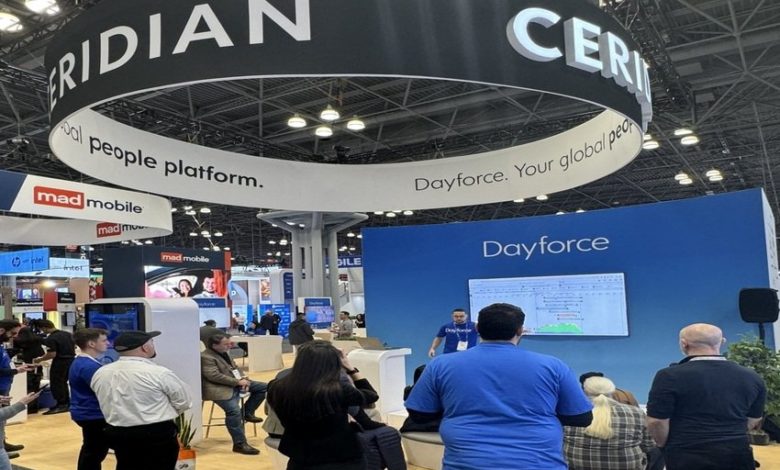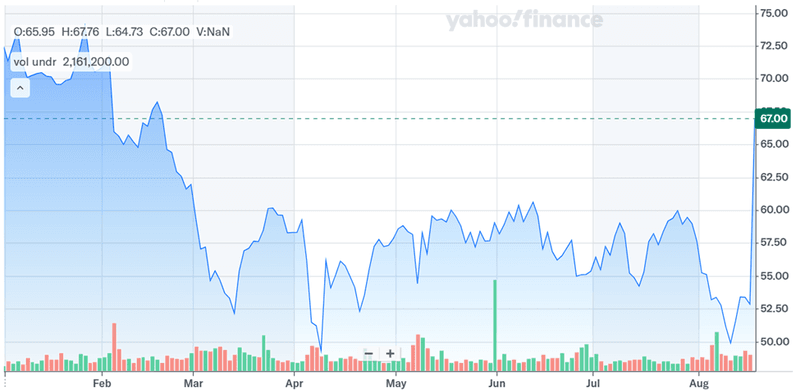Thoma Bravo Circling Dayforce: Why The $9 Billion HR Software Firm Is Back In Play

Dayforce Inc (NYSE:DAY) has entered the takeover spotlight after reports that private equity giant Thoma Bravo is in advanced discussions to acquire the human capital management (HCM) software provider and take it private. The potential deal comes at a pivotal moment. While Dayforce has grown recurring revenue more than 70% since 2021 and recently upgraded guidance for both operating margins and free cash flow, the company’s stock has lost about 60% of its value from pandemic-era highs. Analysts have long argued that the public markets underappreciate its operating model and AI-driven HCM platform, particularly given its strong bookings momentum and growing traction with large enterprises and governments. So is this the perfect deal for Thoma Bravo? What is driving the buyout?
Scalable Recurring Revenue & Expanding Cash Flow
One of the clearest rationales for Thoma Bravo’s interest in Dayforce lies in its steadily expanding recurring revenue base and improving free cash flow profile. In the second quarter, recurring revenue excluding float increased 14% year-over-year, while adjusted EBITDA margins widened to 31.7%, a 420 basis-point improvement from the prior year. The company generated $87 million in free cash flow, representing an 18.7% margin, and raised its full-year free cash flow outlook to 13.5–14% of revenue. Management has also laid out a credible pathway toward $1 billion in free cash flow by 2031, supported by incremental free cash flow conversion of roughly 57%. This scalability is reinforced by record bookings, which have grown over 40% for three consecutive quarters, and by large-scale customer go-lives, including a single deployment that will expand to 500,000 employees by year-end. For Thoma Bravo, this combination of high-margin recurring revenue, visibility into future growth, and rising cash generation fits squarely into its strategy of taking underappreciated public SaaS firms private, applying operational levers, and eventually realizing value through margin expansion and stronger free cash flow conversion. The predictability of Dayforce’s subscription-based revenue, paired with its operating leverage, provides the kind of financial profile that can be optimized under private equity ownership.
Unlocking Back-to-Base Expansion Potential
Dayforce’s underpenetrated customer base offers another major lever that Thoma Bravo could exploit. With nearly 7,000 enterprise customers and an average revenue capture of roughly $13 per employee per month, management sees an opportunity to triple this figure to $40 PEPM by driving broader adoption of its end-to-end suite. Evidence of this monetization runway is already visible: back-to-base sales grew more than 50% in the latest quarter and now represent 40% of total bookings. These expansion deals are typically more profitable than new customer wins, as they benefit from existing integrations, lower acquisition costs, and higher gross margins. Newer modules are gaining traction as well, with managed payroll doubling year-over-year to reach 17% of new deals and AI modules attaching to nearly every new customer. Gross retention remains exceptionally strong at 98%, underscoring the durability of the customer base. For a financial sponsor like Thoma Bravo, this dynamic presents a textbook opportunity to drive growth without disproportionately raising costs. By funding go-to-market initiatives focused on cross-sell and upsell, and by introducing playbooks for account management efficiency, Thoma Bravo could accelerate Dayforce’s wallet share expansion, translating into faster revenue growth and stronger margin capture. This base expansion lever is particularly compelling in the private equity model, where boosting lifetime value from existing accounts often drives the bulk of post-acquisition returns.
Differentiated Platform: Single Data Model Meets AI
Unlike many competitors in the HCM sector that operate across fragmented databases, Dayforce has built its platform on a unified, single data model. This architecture allows companies to replace an average of 12 HR systems with one integrated platform, reducing complexity, improving compliance, and lowering cost. It also creates a powerful foundation for artificial intelligence, where Dayforce is moving quickly. More than half of new customers adopted its AI Assistant in the last quarter, and nearly all included AI people analytics, learning modules, and its broader AI platform. With over 30 AI agents in development, Dayforce is positioning itself not just as an HR system of record but as an AI-enabled “people platform.” This is strategically important for Thoma Bravo, which has shown strong interest in AI-driven assets across its portfolio. Owning a platform that embeds AI into compliance, scheduling, learning, and talent development provides differentiation against Workday, ADP, and Paycom, many of whom still rely on stitched-together solutions. In addition, Dayforce’s AI leverage translates into higher-value contracts and greater customer stickiness, as companies adopting multiple AI-enabled modules are less likely to churn. For Thoma Bravo, the unified data model represents a structural advantage that would be costly to replicate organically, making Dayforce a more valuable long-term asset in the consolidation of the enterprise software sector.
Large-Scale Enterprise & Public Sector Adoption
Dayforce’s accelerating penetration into both large enterprises and government clients adds another dimension of attractiveness for Thoma Bravo. Recent wins include a global apparel retailer replacing eight separate systems across 37,000 employees, a U.S. infrastructure provider managing 300 labor unions across 10,000 employees, and a Canadian multinational consolidating multiple systems. The company also went live with its largest client to date—over 300,000 employees on a single instance, expanding to 500,000 by year-end. Perhaps most notably, the Government of Canada selected Dayforce for its national HR and payroll transformation, positioning the company as a partner for large-scale, regulated deployments. These wins demonstrate both scalability and resilience, particularly in industries like retail, hospitality, manufacturing, and healthcare, where Dayforce already has a strong foothold. For a private equity sponsor, these marquee deployments reduce execution risk and enhance the long-term revenue base. They also open avenues for deeper expansion into regulated and public sector markets, where the barriers to entry are higher and vendor consolidation trends favor end-to-end platforms. Thoma Bravo’s operational expertise in scaling software companies within regulated environments could further amplify this trajectory, strengthening the resilience and longevity of Dayforce’s revenue streams.
Final Thoughts

Source: Yahoo Finance
As we can see in the above chart, the shares of Dayforce surged as much as 22% in pre-market trading on the news, pushing its market capitalization to roughly $8.4 billion, with an enterprise value north of $9 billion including debt. From a valuation standpoint, Dayforce trades at a last-twelve-month enterprise value to revenue multiple of 4.9x and an EV/EBITDA multiple of 34.5x, down from earlier peaks but still well above many SaaS peers. The high multiples reflect both growth expectations and execution risk, particularly in a market where enterprise software spending has cooled since the pandemic. For Thoma Bravo, which has been highly active in 2025 with major acquisitions in both aerospace software and restaurant tech, Dayforce represents a chance to consolidate a resilient platform in a consolidating enterprise software landscape. However, the biggest question is whether they can justify the valuation premium through cost rationalization, deeper penetration, and sustained AI-driven differentiation. Whether or not a deal materializes, the renewed buyout interest underscores Dayforce’s strategic significance as the enterprise HR software market consolidates and evolves in the age of AI.




